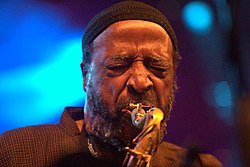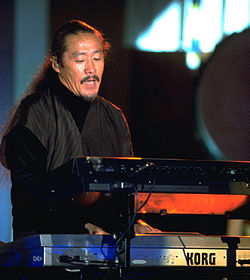Recipients








^[I] Each year is linked to the article about the Grammy Awards held that year.
| Grammy Award for Best New Age, Ambient or Chant Album | |
|---|---|
| Awarded for | Quality albums in the new-age music genre |
| Presented by | National Academy of Recording Arts and Sciences |
| Formerly called | Grammy Award for Best New Age Album (1992–2022); others |
| First award | 1987 |
| Currently held by | Wouter Kellerman, Éru Matsumoto & Chandrika Tandon - Triveni (2025) |
| Website | grammy.com |
The Grammy Award for Best New Age, Ambient or Chant Album is presented to recording artists for quality albums in the new-age music genre at the Grammy Awards, a ceremony that was established in 1958 and originally called the Gramophone Awards. [1] Honors in several categories are presented at the ceremony annually by the National Academy of Recording Arts and Sciences of the United States to "honor artistic achievement, technical proficiency, and overall excellence in the recording industry, without regard to album sales or chart position". [2]
Originally called the Grammy Award for Best New Age Recording, the honor was first presented to Swiss musician Andreas Vollenweider at the 29th Grammy Awards in 1987 for his album Down to the Moon . Two compilation albums featuring Windham Hill Records artists were nominated that same year. [3] The record label was founded by William Ackerman, [4] later an award nominee and 2005 winner for the album Returning . From 1988 to 1991 the category was known as Best New Age Performance. From 1992 to 2023, the award was presented as Best New Age Album. Beginning in 2001, award recipients included the producers, engineers, and/or mixers associated with the nominated work in addition to the recording artists. [5] From 2023, the category has been known as Best New Age, Ambient or Chant Album. [6]
While "new-age" music can be difficult to define, journalist Steven Rea described the genre as "music that is acoustic, electronic, jazzy, folky and incorporates classical and pop elements, Eastern and Latin influences, exotic instrumentation, and environmental sound effects." [7] According to the category description guide for the 52nd Grammy Awards, the award is presented for instrumental or vocal new-age albums "containing at least 51% playing time of newly recorded material", with seasonal recordings not being eligible. [8] The addition of the award category reflected a "coming of age" of the music genre, though some musicians classified as new age dislike the term "new age" and some of its negative connotations. [7]
As of 2015, Paul Winter holds the record for the most wins in this category, having won six times (four times as the leader of the group Paul Winter Consort). Winter is the only musician to win the award consecutively; he received an award in 1994 for Spanish Angel as a member of his ensemble and another in 1995 for Prayer for the Wild Things as a solo artist. Irish musician Enya has received four awards. Kitarō holds the record for the most nominations, with sixteen (with only one win, in 2001). All five volumes of Kitarō's Sacred Journey of Ku-Kai series were nominated for Best New Age Album.
Pianist Peter Kater held the record for most nominations without a win, with 12, until he finally won his first Grammy (for Dancing on Water ) in 2018. He also holds the record for the most consecutive nominations, with 11, having been nominated every year between 2007 and 2018.
Native American flutist R. Carlos Nakai is the only artist to be nominated for more than one work within the same year; for the 42nd Grammy Awards he was nominated alongside Paul Horn for Inside Monument Valley and for his own album, Inner Voices.








^[I] Each year is linked to the article about the Grammy Awards held that year.
He was nominated for Grammys for Best New Age Performance for his albums Castalia (1988) and Tibet (1989), and finally won for 1990's Mark Isham.